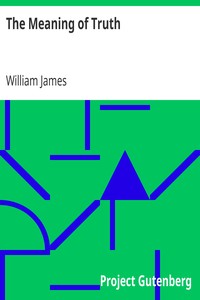The Meaning of Truth by William James
"The Meaning of Truth" by William James is a philosophical work written during the early 20th century, serving as a sequel to his earlier work "Pragmatism." The book explores the concept of truth through the lens of pragmatism, investigating how beliefs correspond to reality and the practical implications that arise from this relationship. The author engages with criticisms of his pragmatic approach and delves into the philosophical debate surrounding the nature of
truth, emphasizing its function in relation to human experience. The opening of this work begins with a preface that sets the stage for the discussion about truth, emphasizing its dynamic nature as something that "happens" to ideas and is validated through experience. James outlines the pragmatic view that true ideas are those that can be assimilated and verified in real-life contexts, contrasting this with traditional views that focus solely on the abstract properties of truth. He addresses critiques from other philosophers and discusses the importance of radical empiricism in understanding how cognition and reality are interrelated. In lively and engaging prose, James establishes a foundation that invites readers to consider the implications of pragmatism on their understanding of truth, laying out the groundwork for the chapters that follow. (This is an automatically generated summary.)
Read now or download (free!)
| Choose how to read this book | Url | Size | ||||
|---|---|---|---|---|---|---|
| Read online (web) | https://sendtokindle.compellingsciencefiction.com/ebooks/5117.html.images | 398 kB | ||||
| EPUB3 (E-readers incl. Send-to-Kindle) | https://sendtokindle.compellingsciencefiction.com/ebooks/5117.epub3.images | 209 kB |
Send
to kindle email: |
|||
| EPUB (no images, older E-readers) | https://sendtokindle.compellingsciencefiction.com/ebooks/5117.epub.noimages | 212 kB | ||||
| Kindle | https://sendtokindle.compellingsciencefiction.com/ebooks/5117.kf8.images | 375 kB | ||||
| older Kindles | https://sendtokindle.compellingsciencefiction.com/ebooks/5117.kindle.images | 352 kB | ||||
| Plain Text UTF-8 | https://sendtokindle.compellingsciencefiction.com/ebooks/5117.txt.utf-8 | 354 kB | ||||
| Download HTML (zip) | https://www.gutenberg.org/cache/epub/5117/pg5117-h.zip | 204 kB | ||||
| There may be more files related to this item. | ||||||
Similar Books
About this eBook
| Author | James, William, 1842-1910 |
|---|---|
| Title | The Meaning of Truth |
| Note | Sequel to: Pragmatism. |
| Note | Reading ease score: 54.1 (10th to 12th grade). Somewhat difficult to read. |
| Contents | The function of cognition -- The tigers in India -- Humanism and truth -- The relation between knower and known -- The essence of humanism -- A word more about truth -- Professor Platt on truth -- The pragmatist account of truth and its misunderstanders -- The meaning of the word truth -- The existance of Julius Caesar -- The absolute and the strenuous life -- Professor Hebert on pragmatism -- Abstractionism and 'relativismus' -- Two English critics -- A dialogue. |
| Credits |
Text file produced by Steve Harris, Charles Franks and the Online
Distributed Proofreading Team HTML file produced by David Widger |
| Language | English |
| LoC Class | B: Philosophy, Psychology, Religion |
| Subject | Pragmatism |
| Subject | Truth |
| Subject | Reality |
| Category | Text |
| EBook-No. | 5117 |
| Release Date | Feb 1, 2004 |
| Most Recently Updated | Jul 4, 2013 |
| Copyright Status | Public domain in the USA. |
| Downloads | 911 downloads in the last 30 days. |
| Project Gutenberg eBooks are always free! | |

